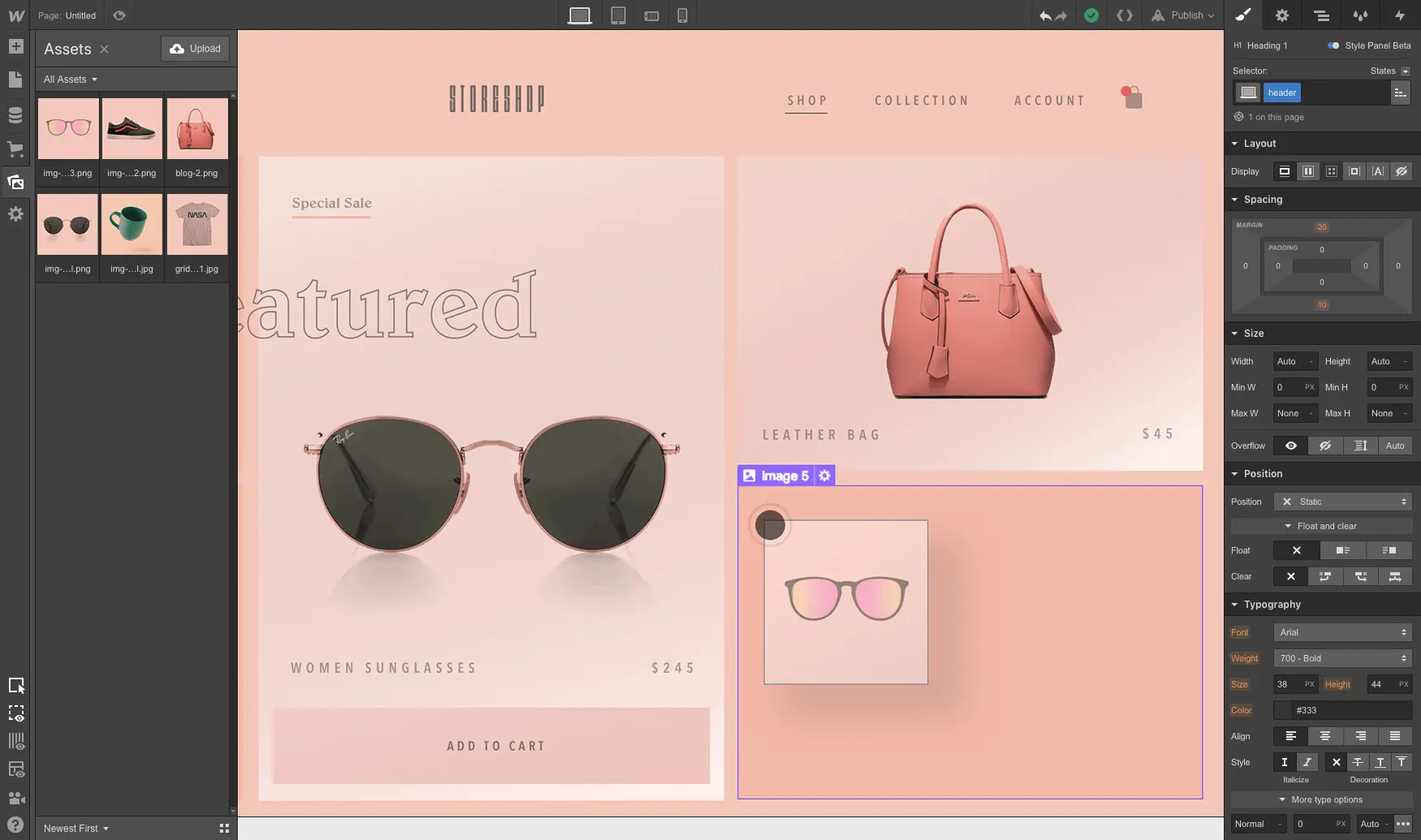Webflow vs. Shopify
Webflow gives designers the first completely visual, completely customizable ecommerce platform — at ¼ the cost of Shopify.


Compare
The web is the world’s most saturated marketplace — make sure your online store stands out with Webflow.
Design & code
Building your storefront
Design flexibility
Webflow provides complete design freedom, while Shopify offers well-designed but restrictive templates
Build custom sites, carts, and checkout experiences without template restrictions.
Shopify templates are beautiful, no doubt. As long as you’re okay with your store looking just like your competitor’s.
Code requirements
Neither platform requires code knowledge to start, but you need to work in the Liquid template language to customize Shopify sites
Build a bespoke store that embodies your brand — without even looking at code.
No coding necessary unless you want to customize your template. Hope you enjoy the Liquid templating system!
Interaction and animation tools
Build complex, rich animations with Webflow that bring your store to life
Visually author parallax scrolling effects, multi-step animations, and more.
Live with what’s built into the template, or add a dev to your already slim bottom-line.
Ease of use
With the constraints imposed by templates comes relative ease of use — until you need something custom
Webflow is a powerful visual development tool with a bit of a learning curve. But with Webflow University to support you, you’ll be up and running quickly.
Get started quickly and your site will look like it.
Templates
Both Webflow and Shopify offer 100+ free and premium templates
Build custom sites, carts, and checkout experiences without template restrictions.
Shopify templates are beautiful, no doubt. As long as you’re okay with your store looking just like your competitor’s.
Free plan
Explore Webflow for as long as you need to — you only need to pay when you’re ready to go live. Unlike Shopify, which gives you two weeks to get started.
You can use Webflow for free forever to build your store and publish on a webflow.io domain. Only pay when you want to go live and process orders.
Shopify gives you a 14-day trial window. Better hurry up.
SEO & content marketing
Driving traffic to your store
CMS & blogging
Use Webflow’s flexible, visual CMS to make content marketing a key — and completely custom — tool in your marketing arsenal
Use the same CMS that powers your store to build and publish blog posts, case studies, testimonials, and more.
Check the “we blog” tickbox. Make do with the content types and formats your template allows for.
SEO
Automate SEO with advanced technical features and lightning-fast page loads
Dynamically create SEO-friendly title tags, descriptions, H1 tags, and URLs from page and article titles. Enjoy auto sitemap generation on every publish and ranking boosts from fast-loading, clean code served over HTTPs
Supports best practices like customizable H1, title and meta tags, and SEO friendly urls.
Dynamic product and content integration
Seamlessly integrate products into your content with Webflow CMS
Dynamically reference your products in blog posts and content areas throughout your site.
You can always add a link and a photo. You know, the old-fashioned way.
Marketing integrations
Shopify provides plenty of integration options and an app store. With Webflow, you can integrate almost anything with just a few lines of custom code
Facebook, Instagram, Mailchimp and Google Analytics are just some of the powerful integrations you can easily add to Webflow.
Shopify features an extensive library of integrations
The buyer experience
Ecommerce UX
Customizable checkout
Webflow lets you design fully customizable checkout experiences
Customize every detail of your checkout experience, without writing code, and add custom messaging as needed. We start with well-researched best practices, but every detail is yours to tweak.
Get the checkout you get. Each Shopify theme has a well-designed and thoroughly tested checkout experience. But what you get is what you get.
Customizable carts
Webflow lets you build beautifully customizable carts
Create clear, engaging cart experiences with robust positioning and animation options, plus full layout control within the cart.
Get the cart you get. Again, Shopify gives you the cart their experts designed. It’s great — but it is what it is.
The store owner experience
Management and fulfillment
Store management tools
Webflow provides an intuitive site management dashboard, while Shopify offers extra dashboard features
Webflow has a client-friendly order management dashboard with simple tools.
Shopify has one dashboard to manage order fulfillment, unified inventory, shipping, payments, and analytics.
Order management
Easy order management from both platforms
Immediately see open orders as soon as you log in, add and edit items right on the product page, and add teammates to help with site management.
Shopify has worked hard to make fulfillment a breeze, and it shows.
Transactional emails
Webflow provides additional design control for automated transactional emails sent to your customers
Easily create and style all the automated emails online shoppers expect, right inside the Designer.
Tweak the visual design and copy of your automatic email templates.
Payment options
Shopify supports a wider array of payment options, though Webflow accepts payments from 200+ countries through Stripe, PayPal, Apple Pay and Google Pay.
Accept payments through credit card, PayPal, Apple Pay and Google Pay. You can accept payments from 200+ countries across the globe, and open a store in 119.
Shopify connects with a range of payment processors, and offers Shopify Payments in certain countries.
Shipping fulfillment
Webflow offers basic shipping tools, while Shopify provides advanced shipping abilities
Easily configure manual shipping rules and set custom rates, so you can ship around the world.
Shopify provides automated shipping calculations and the ability to print shipping labels, which requires manual integrations in Webflow.
Design
Design and build your store from the ground up — without writing a line of code.
Build with the latest layout technologies
Use CSS grid or flexbox — or both — to build cutting-edge layouts — and adjust them for every breakpoint.
Take control of your typography
Use any font out there, tweak every detail from line-height to text direction, and use any unit, from ems to vw.
Go responsive
Easily preview and tweak your design for every breakpoint, and use relative units to reflow gracefully.
Get colorful
Save your brand palette as global swatches, layer background images, gradients, and overlays, even add CSS filters.
Advanced interaction and animation tools
Bring your site to life with engaging animations and trust building microinteractions based on page load, scrolling, mouse movement, and clicks.
Flexible product CMS
Webflow’s flexible, code-free CMS powers your store and all your other dynamic content, so you can seamlessly feature your products.
What people are saying about
Webflow Ecommerce
Get started for free
Try Webflow for as long as you like with our free Starter plan. Purchase a paid Site plan to publish, host, and unlock additional features.
Try Webflow for as long as you like with our free Starter plan. Purchase a paid Site plan to publish, host, and unlock additional features.
























